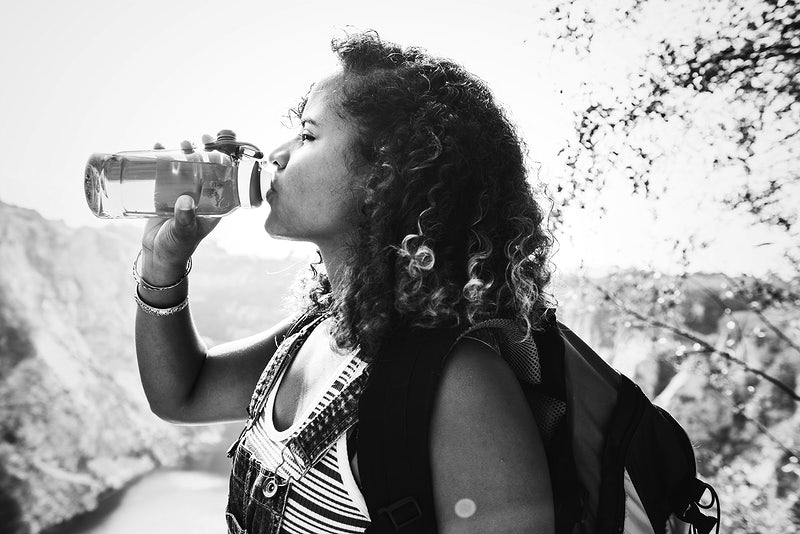Source: Vogue
After all, there is such a thing as too much of a good thing
BY HASINA KHATIB
A steady intake of water is the worst-kept secret of skincare—just quiz any A-lister about the secret behind her million-dollar glow and she will smile mysteriously before crediting eight glasses of water as her saviour. Clocking in those eight glasses in the day serves as the key to everything from glowing skin to smoother functioning of the body and, in recent times, it has triggered a wave of water drinking challenges on social media. However, drinking beyond the required quota of water that your body needs could do more harm than good—here’s what an expert nutritionist wants you to know.
Why everyone wants you to drink more water
Fact: Our blood constitutes over 90 per cent water, which is responsible for ferrying oxygen to different parts of the body. Beyond ensuring our everyday survival, water also plays an invaluable role for those in the quest for glowing, supple skin. Kejal Shah, a Mumbai-based lifestyle nutritionist, explains, “Dietary water consumption ensures that your cutaneous layer has more moisture. This, in turn, improves skin elasticity and enables your skin to return to its original state every time it is stretched and pulled. Well-hydrated skin also appears firm and supple due to the enhancement of collagen density. The physical structure of the skin is made up of collagen that is 60 per cent water. Drinking water regularly, thus, boosts your collagen levels and prevents premature skin ageing.” Our skin also has a natural moisturising mechanism that allows it to maintain its soft, supple texture, known as the skin-water balance. Drinking adequate amounts of water can help the skin maintain this fine balance of water and oil and smoothly execute its function, she adds.
Is there such a thing as drinking too much water?
Water is clearly the good guy of skincare, but it is possible to have too much of a good thing. Shah cautions, “Excess of anything is bad, and the same stands true for drinking water. Consuming water in excessive amounts can lead to overhydration and water intoxication. This can cause lethargy, appetite loss, headache, confusion and loss of focus and, in severe conditions, it can lead to nausea, vomitting and seizures.”
If you aren’t sure if your water intake is excessive, one of the first markers is the colour of your urine. She adds, “Dark yellow is a bad sign as it means that you are dehydrated. Ideally, the colour should be light yellow which shows that your hydration level is optimal. However, if your urine is transparent, it might mean you are overhydrated and need to manage your water intake.” Frequent urination could be another signal that your water intake is exceeding the recommended amount. “Most people urinate six or eight times a day, but if you urinate over ten times in the same day, it could mean that you are drinking more water than your body needs,” says the Mumbai-based nutritionist.
How to develop the ideal schedule for drinking water in the day
If you are looking to ensure that your hydration levels are optimal, it pays to follow the golden rule of drinking eight glasses of water in a day. However, Shah advises that you can modify your total fluid intake depending on certain external factors such as exercise, when you need to drink extra water to cover the fluid loss before, during and after a workout, as well as environmental factors as hot or humid weather can make you sweat and require additional fluid. While drinking sufficient water should be a daily habit, Shah has also drawn up an easy-to-follow schedule:
After waking up: Drink one glass of water after waking up to help activate your internal organs. The water will also help remove any toxins before your first meal of the day.
Before a meal: Drink one glass of water half an hour before a meal to help digestion. Remember not to drink too soon before or after a meal as the water will dilute the digestive juices. Drink water an hour after the meal to allow the body to absorb the nutrients.
Before a bath: Drink one glass of water before taking a bath to help lower your blood pressure.
Before sleep: Drink one glass of water an hour before bedtime to replenish any fluid loss that can occur during the night.
As a rule of thumb, Shah recommends using your thirst cues and urine colour as a guide for preventing overhydration. “Drink water when you are thirsty and until your urine is light yellow to clear. If you are experiencing excessive thirst, inform your doctor right away, as this may be a symptom of another serious health issue,” she concludes.

